-
 T'Wolves push Lakers to brink of elimination, Celtics and Knicks win
T'Wolves push Lakers to brink of elimination, Celtics and Knicks win
-
Suspect charged with murder in Canada car attack that left 11 dead

-
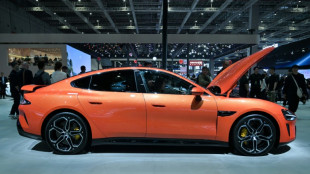 Smart driving new front in China car wars despite fatal crash
Smart driving new front in China car wars despite fatal crash
-
Cardinals set to pick conclave date to elect new pope

-
 Miami's unbeaten MLS run ends after Dallas comeback
Miami's unbeaten MLS run ends after Dallas comeback
-
After 100 days in office, Trump voters still back US president

-
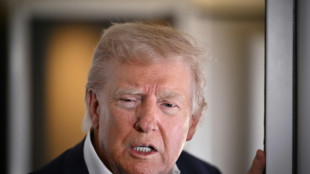 US anti-disinformation guardrails fall in Trump's first 100 days
US anti-disinformation guardrails fall in Trump's first 100 days
-
Dick Barnett, two-time NBA champ with Knicks, dies at 88

-
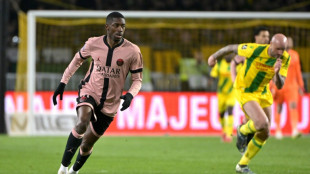 PSG hope to have Dembele firing for Arsenal Champions League showdown
PSG hope to have Dembele firing for Arsenal Champions League showdown
-
Arteta faces Champions League showdown with mentor Luis Enrique
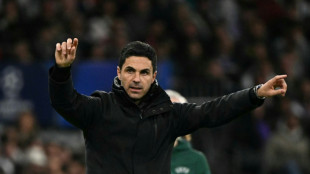
-
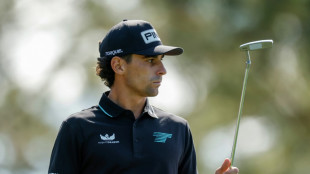 Niemann wins LIV Mexico City to secure US Open berth
Niemann wins LIV Mexico City to secure US Open berth
-
Slot plots more Liverpool glory after Premier League triumph

-
 Novak and Griffin win PGA pairs event for first tour titles
Novak and Griffin win PGA pairs event for first tour titles
-
Inter Miami unbeaten MLS run ends after Dallas comeback

-
 T'Wolves rally late to beat Lakers, Knicks edge Pistons amid controversy
T'Wolves rally late to beat Lakers, Knicks edge Pistons amid controversy
-
Japan's Saigo wins playoff for LPGA Chevron title and first major win

-
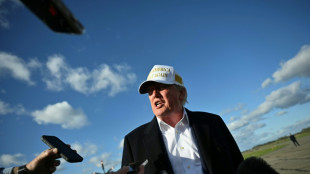 Trump tells Putin to 'stop shooting' and make a deal
Trump tells Putin to 'stop shooting' and make a deal
-
US says it struck 800 targets in Yemen, killed 100s of Huthis since March 15

-
 Conflicts spur 'unprecedented' rise in military spending
Conflicts spur 'unprecedented' rise in military spending
-
Gouiri hat-trick guides Marseille back to second in Ligue 1
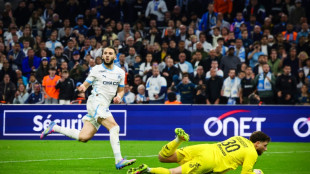
-
 Racing 92 thump Stade Francais to push rivals closer to relegation
Racing 92 thump Stade Francais to push rivals closer to relegation
-
Inter downed by Roma, McTominay fires Napoli to top of Serie A

-
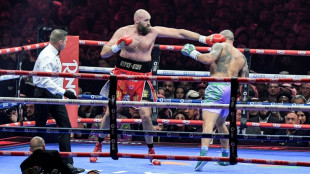 Usyk's unification bout against Dubois confirmed for July 19
Usyk's unification bout against Dubois confirmed for July 19
-
Knicks edge Pistons for 3-1 NBA playoff series lead

-
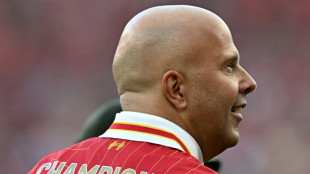 Slot praises Klopp after Liverpool seal Premier League title
Slot praises Klopp after Liverpool seal Premier League title
-
FA Cup glory won't salvage Man City's troubled season: Guardiola

-
 Bumrah, Krunal Pandya star as Mumbai and Bengaluru win in IPL
Bumrah, Krunal Pandya star as Mumbai and Bengaluru win in IPL
-
Amorim says 'everything can change' as Liverpool equal Man Utd title record
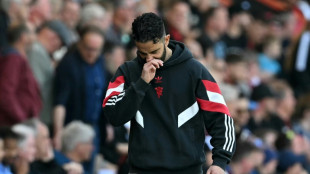
-
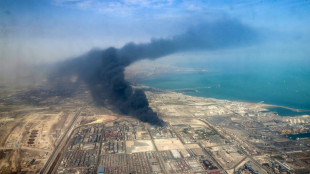 Iran's Khamenei orders probe into port blast that killed 40
Iran's Khamenei orders probe into port blast that killed 40
-
Salah revels in Liverpool's 'way better' title party
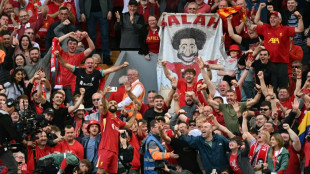
-
 Arsenal stun Lyon to reach Women's Champions League final
Arsenal stun Lyon to reach Women's Champions League final
-
Slot 'incredibly proud' as Liverpool celebrate record-equalling title
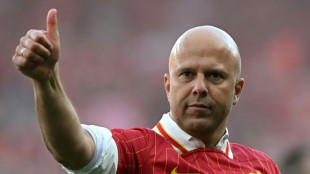
-
 Israel strikes south Beirut, prompting Lebanese appeal to ceasefire guarantors
Israel strikes south Beirut, prompting Lebanese appeal to ceasefire guarantors
-
Smart Slot reaps rewards of quiet revolution at Liverpool
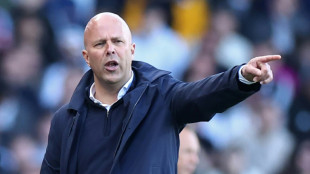
-
 Krunal Pandya leads Bengaluru to top of IPL table
Krunal Pandya leads Bengaluru to top of IPL table
-
Can Trump-Zelensky Vatican talks bring Ukraine peace?
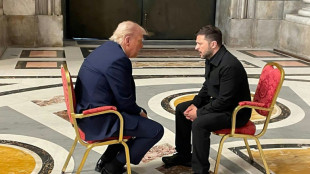
-
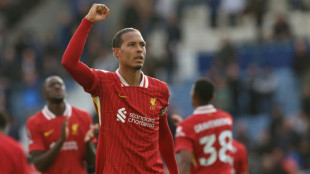 Van Dijk hails Liverpool's 'special' title triumph
Van Dijk hails Liverpool's 'special' title triumph
-
Five games that won Liverpool the Premier League

-
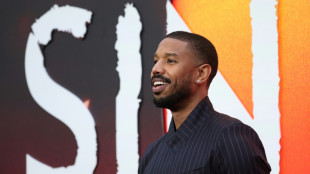 'Sinners' tops N.America box office for second week
'Sinners' tops N.America box office for second week
-
Imperious Liverpool smash Tottenham to win Premier League title
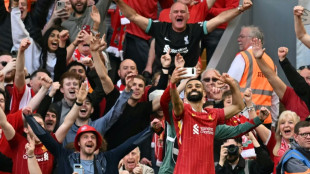
-
 Man City sink Forest to reach third successive FA Cup final
Man City sink Forest to reach third successive FA Cup final
-
Toll from Iran port blast hits 40 as fire blazes
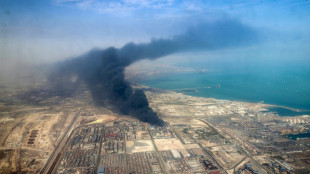
-
 Canada car attack suspect had mental health issues, 11 dead
Canada car attack suspect had mental health issues, 11 dead
-
Crowds flock to tomb of Pope Francis, as eyes turn to conclave
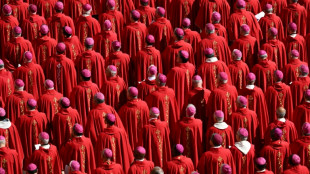
-
 Inter downed by Roma, AC Milan bounce back with victory in Venice
Inter downed by Roma, AC Milan bounce back with victory in Venice
-
Religious hate has no place in France, says Macron after Muslim killed in mosque
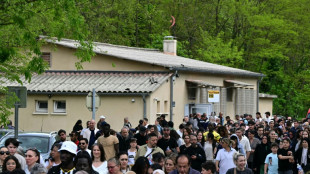
-
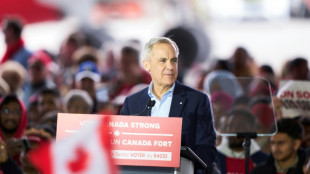 Last day of Canada election campaign jolted by Vancouver attack
Last day of Canada election campaign jolted by Vancouver attack
-
Barcelona crush Chelsea to reach women's Champions League final

-
 Nine killed as driver plows into Filipino festival in Canada
Nine killed as driver plows into Filipino festival in Canada
-
Germany marks liberation of Bergen-Belsen Nazi camp

Europe's Economic Self-Sabotage
Europe, once a beacon of economic prowess, is grappling with challenges that threaten its unique economic model. The European Union's economy, valued at approximately $20.29 trillion in nominal terms in 2025, stands as the second largest globally, yet it faces stagnation and competitive decline. Germany, France, and Italy, which collectively account for over half of the EU’s GDP, are pivotal to this narrative, but their struggles reverberate across the bloc.
The EU’s economic woes stem from a confluence of internal and external pressures. Germany, the bloc’s largest economy, contracted by 0.3% in the final quarter of 2023, hampered by high energy costs, a shortage of skilled labour, and chronic underinvestment in infrastructure. The automotive sector, a cornerstone of German industry, faces existential threats from Chinese electric vehicle manufacturers, who are flooding European markets with affordable alternatives. Central and Eastern Europe, heavily integrated into German supply chains, feel the ripple effects, with countries like Hungary and Slovakia at risk as demand falters.
Innovation, or the lack thereof, is a critical issue. The EU has failed to meet its target of spending 3% of GDP on research and development, languishing at around 2% for decades. This shortfall is stark when compared to the United States, where tech giants like Amazon and Alphabet dominate global innovation. Europe’s universities, with only one institution in the global top 30, struggle to drive cutting-edge research, and much of the bloc’s R&D funding is misallocated, particularly in Germany, where it is heavily skewed towards the automotive sector. This lack of diversification leaves Europe vulnerable in a rapidly evolving global economy.
Energy policy further complicates the picture. Despite a 26% reduction in greenhouse gas emissions per employed person over the past decade, 70% of the EU’s energy still comes from fossil fuels, and the bloc remains 63% dependent on imported fuel. The push for renewables, while commendable, is uneven—Sweden leads with nearly two-thirds of its energy from renewable sources, while countries like Ireland and Belgium lag behind. High energy prices, exacerbated by geopolitical tensions and the loss of Russian gas supplies, have strained energy-intensive industries, particularly in Germany.
Trade dynamics add another layer of complexity. The EU is the world’s largest exporter of manufactured goods and services, accounting for 14% of global trade. However, the spectre of tariffs, particularly from the United States, looms large. With over €500 billion in annual exports to the U.S., any imposition of tariffs could devastate European industries. The EU’s response—potential counter-tariffs or World Trade Organization complaints—may not suffice to protect its markets, especially as global supply chains face disruptions from conflicts and protectionist policies.
Internally, the EU’s single market, a cornerstone of its economic integration, is under strain. Calls for deeper integration, including a capital markets union and harmonised regulations, are met with resistance from member states guarding national interests. The EU’s budget, at €2 trillion for 2021–2027, is substantial but insufficient to address cross-border challenges like defence or green energy transitions. Moreover, the Council of Ministers’ veto system hampers swift decision-making, stalling progress on critical issues like a unified defence policy or fiscal coordination.
The EU’s social model, with 26.8% of GDP spent on welfare in 2023, is a point of pride but also a burden. High public debt in countries like Greece, Italy, and France, all exceeding 100% of GDP, limits fiscal flexibility. Austerity policies in the past have stifled growth, and the bloc’s projected population decline—to 420 million by 2100—raises concerns about sustaining this model amid an ageing workforce.
Geopolitical fragmentation exacerbates these challenges. The EU’s trade openness, with extra-EU trade exceeding 40% of GDP, makes it vulnerable to global disruptions. Initiatives like the Global Gateway aim to build resilient supply chains, but they compete with China’s Belt and Road and face internal coordination hurdles. Meanwhile, the euro, the world’s second most traded currency, is under scrutiny as global debt levels soar and the U.S. dollar’s dominance raises questions about financial stability.
Europe’s tourism sector, a bright spot, underscores its cultural and economic allure, accounting for 60% of global international visitors. Yet, even this strength is at risk from economic uncertainty and potential trade wars, which could deter visitors and disrupt the 1.1 billion annual tourism trips by EU residents.
The EU stands at a crossroads. Its unique blend of free-market principles and social welfare, coupled with an integrated single market, has long been a global model. However, without bold reforms—streamlining regulations, boosting innovation, diversifying energy sources, and deepening integration—the bloc risks undermining its economic vitality. The path forward demands urgency and unity, lest Europe’s economic legacy becomes a cautionary tale.

Scientists: "Mini organs" from human stem cells

ICC demands arrest of Russian officers

Europe and its "big" goals for clean hydrogen

Putin and the murder of Alexei Navalny (47†)

Measles: UK authorities call for vaccinate children

EU: Von der Leyen withdraws controversial pesticide law

EU: Prison for "paedophilia manuals" and child abuse forgeries

EU: 90% cut of all greenhouse gas emissions by 2040?

How is climate change spreading disease?

Business: Is it important to speak multiple languages?

Trump's return could leave Europe 'on its own'



